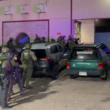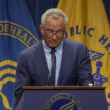A leading general has actually recommended the United States might pursue military options to aid Ukrainian efforts to export its grain and help to end Russia’s blockade of the Black Sea coast. Gen. Christopher Cavoli, who has actually been chosen to be the next leader of NATO, informed senators at a hearing on Thursday that he may use military choices to permit grain to be exported. When inquired about what he would do, Cavoli stated that if he’s validated he would “provide the military options required by our civilian leaders.”
“Clearly the way we would approach that would have to be a whole-of-government approach, which may or may not include a military component,” he told lawmakers.
It’s unclear what that would require, whether it be having U.S. soldiers straight engage with Russian forces or the military developing alternative ways to deliver grain. Ukraine is among the world’s leading exporters of wheat, sunflower oil, and canola oil.
Cavoli, on the other hand, kept in mind that U.S. sanctions versus Russia have actually added to around the world grain lacks.
“The grain shortages that we’re experiencing from both Russia and Ukrainian production being unable to come out of the countries in large volumes or being sanctioned and not being sold are being felt on the African continent,” he remarked.
About a week back, an expert cautioned the United Nations Security Council that the Russia-Ukraine dispute is including “fuel to a fire that was long-burning” and said the world only has about 10 weeks’ worth of wheat supplies left.
“I want to start by explicitly saying that the Russia–Ukraine war did not start the food security crisis. It simply added fuel to a fire that was long burning. A crisis we detected tremors from long before the COVID 19 pandemic exposed the fragility of our supply chains,” Gro Intelligence CEO Sara Menker said on May 19, according to a transcript.
Aside from the dispute, which began on Feb. 24, dry spells and other weather condition concerns all over the world have actually added to grain scarcities.
“I share this because we believe it’s important for you all to understand that even if the war were to end tomorrow, our food security problem isn’t going away anytime soon without concerted action,” she added.
The Kremlin has said that the United States and Western nations are to blame for grain lacks. Kremlin representative Dmitry Peskov today declined current allegations that a Russian blockade of Ukrainian ports is to blame.
“We categorically reject these accusations and, on the contrary, accuse Western countries that they have taken a number of illegal actions that led to this,” Peskov told reporters, according to Reuters.
The West, he added, “must cancel those illegal decisions that prevent the chartering of ships, that prevent the export of grain, and so on,” so that supplies can be shipped out.
It doesn’t appear likely, nevertheless, that the United States would unwind any of its sanctions against Russia in the future. In March, Joe Biden stated that there might be a food scarcity activated by the dispute and sanctions.
“With regard to food shortage … it’s going to be real,” Biden said several months ago. “The price of these sanctions is not just imposed upon Russia, it’s imposed upon an awful lot of countries as well, including European countries and our country as well.”
H/T The Epoch Times










